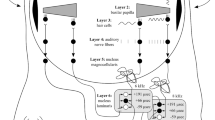Abstract
In this article, I discuss the history of the idea of teleology in order to prepare a discussion of the status of teleology in the field of psychology. I start of by illustrating the inception of teleology in metaphysical debates and then move on to its disqualification in modern science. I then proceed to give an outline of a recent countermovement to the disqualification of teleology in scientific explanation. By the end of the article, an informed and nuanced foundation is achieved, and through this, one can fruitfully proceed to investigate the status of teleology in psychology.
Similar content being viewed by others
Notes
Processes which can be explained by recourse to blind mechanistic forces are described by the term automaton in Aristotle’s philosophical system (Koutroufinis 2013 and 2014).
The outline of this debate builds on Køppe (1993, p. 145–54).
Most notably through the work of Stephen J. Gould (1941–2002), see especially Gould (2007).
When I repeatedly use the term revolutionary to describe Darwin’s theory, I do not intend to sensationalize or dramatize it. That Darwin’s disavowal of teleology was revolutionary and is a widely held opinion among scholars of evolutionary theory—take as an example Monod’s position (stated throughout Monod 1973) that Darwin’s theory counteracted almost all of the most important ideologies of the past and present, since they all contains some grain of teleology.
It is important not to mistake this argument for a circular one since the point is that Kant inserts a dynamics between parts and hole where there previously was simply a black-box between cause and effect.
Of course Kant’s concept of self-organization refers to reciprocities in the casual structure of organisms, while modern bio-scientists use the concept to describe open systems operating far from thermodynamic equilibrium. Hence, Kant’s concept of self-organization is much more generic than the systems-theoretical version.
The most simple version of the autogen consists of the coupling of autocatalysis and self-assembly, which are two non-linear self-organizing processes.
By providing empirical examples with testable consequences conceptually encompassing both MT, FT, and ET aspects (see immediately below)
Importantly Deacon does not claim that the autogen system is in any way alive; it merely illustrates how the minimal conditions of something being alive are co-constituted with the minimal conditions of semiosis. Therefore, the autogen model does not purport to be mentally driven (it does not own an internal representation of its surroundings), but on the contrary, it represents a model of the genesis of those self-constraining properties which abound in living and mental systems (the basic components necessary to form an internal representation of the environs).
References
Aristotle. (1970). Aristotle’s physics, books I and II. Oxford: Clarendon Aristotle Ser.
Aristotle. (1978). (Trans. Hamlyn, D. W.) Aristotle's De Anima, Books II and III, (with Certain Passages from Book I). Reprint. edn. Oxford: Clarendon Aristotle Ser.
Chelsea, H. C. (2015). Chronos in Aristotle’s physics : On the nature of time. Cham: Springer.
Christiansen, L. (2003). Metafysikkens Historie. 2. Reviderede Og Forøgede Udgave ed. Kbh: Museum Tusculanum.
Danziger, K. (1985). Origins of the psychological experiment as a social institution. American Psychologist, 40, 133–140.
Danziger, K. (1990). Constructing the subject: Historical origins of psychological research. New York: Cambridge University Press.
Deacon, T. W. (2012). Incomplete nature : How mind emerged from matter (1st ed.). New York: W.W. Norton & Co..
Deacon, T. (2016). Reconsidering Darwin’s ‘several powers. Biosemiotics, 9(1), 121–128.
Deacon, T., & Koutroufinis, S. (2014). Complexity and dynamical depth. Information (Basel), 5(3), 404–423.
Engelsted, N. (2017). Catching up with Aristotle a journey in quest of general psychology (1st ed.). Cham: Springer International Publishing.
Gould, S. J. (2007). Punctuated equilibrium. Cambridge: Belknap Press of Harvard University Press.
Jonas, H. (1997). Das Prinzip Leben. Suhrkamp: Frankfurt/M.
Kant, I. (2013). The critique of judgment. Lanham: Start Publishing LLC.
Køppe, S. (1993). Virkelighedens niveauer : de nye videnskaber og deres historie . 2. udgave. Gyldendal: Kbh.
Koutroufinis, S. (2012) The understanding of the organism between purposiveness and entropy – a historic-theoretical consideration. In: Gadebusch-Bondio, M; Siebenpfeiffer, H.; Fischer, T. (eds.): Konzepte des Humanen, Friburgo/Munich, Editorial Alber, pp. 191–206.
Koutroufinis, S. (2013). Teleodynamics: A neo-naturalistic conception of organismic teleology. In B. Henning & A. Scarfe (Eds.), Beyond mechanism: Putting life Back into biology (pp. 309–342). Lanham: Lexington Books.
Koutroufinis, S. (2014). Life and process, towards a new biophilosophy (process thought; 26). Berlin: De Gruyter.
Koutroufinis S (2016) Modern biological neo-teleologism vs. Aristotle’s genuine telos. In biocosmology - neo-Aristotelism. Vol. 6, Nos. 3 and 4. pp. 414-427.
Mammen, J. (1997) Menneskebilleder i psykologien - og en diskussion med teologien. IN Erkendelse, stræben, følelse: Ti bidrag til dansk almenpsykologi i anledning af Henrik Poulsens 70-års dag 27. september 1997. red. / Preben Bertelsen; Lars Hem; Jens Mammen. Århus : Aarhus Universitetsforlag, 1997. s. 103–119.
Mayr, E. (1988). Toward a new philosophy of biology : Observations of an evolutionist. Cambridge: Belknap Press.
Monod, J. (1973). Chance and necessity : an essay on the natural philosophy of modern biology. New York: Vintage books.
Prigogine, Ilya; Stengers, Isabelle (1984). Order out of Chaos: Man's new dialogue with nature. Flamingo.
Sachs, J. (1995). Aristotle's physics: A guided tour. Rutgers University Press.
Woodfield, A. (1976). Teleology. Cambridge: Cambridge UP.
Žižek, S. (2014). Absolute Recoil : Towards a New Foundation of Dialectical Materialism. London: Verso.
Acknowledgments
I would like to thank Denis K. Ebbesen and the rest of the complexity theory study group for pounding coffee and abstract concepts. Spirit is concrete.
Author information
Authors and Affiliations
Corresponding author
Ethics declarations
Conflict of Interest
The author declares that he has no conflict of interest.
Human and Animal Rights
This article does not contain any studies with human participants or animals.
Additional information
Publisher’s Note
Springer Nature remains neutral with regard to jurisdictional claims in published maps and institutional affiliations.
Rights and permissions
About this article
Cite this article
Olsen, J. From Teleology to Psychology. Hu Arenas 5, 359–368 (2022). https://doi.org/10.1007/s42087-020-00137-3
Received:
Revised:
Accepted:
Published:
Issue Date:
DOI: https://doi.org/10.1007/s42087-020-00137-3




